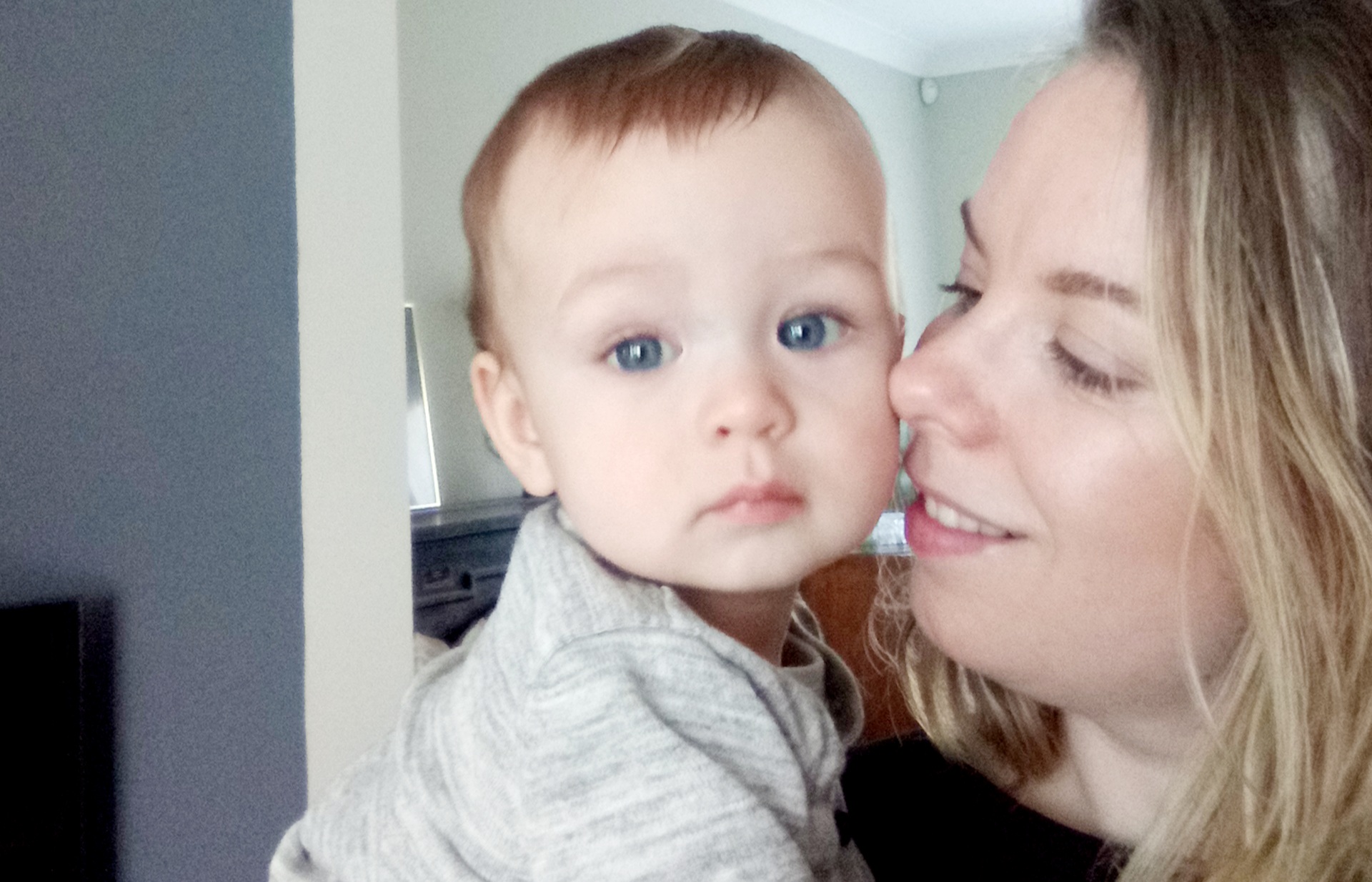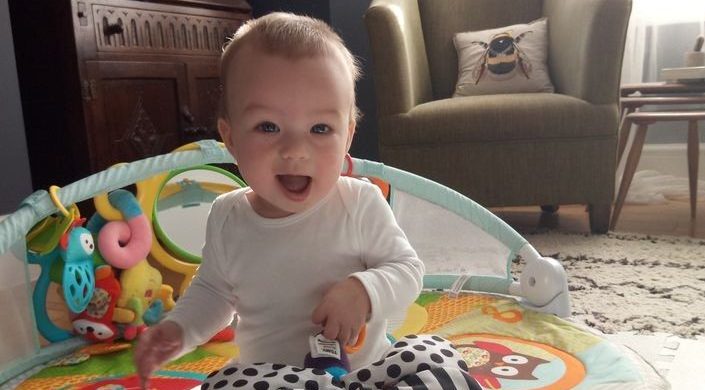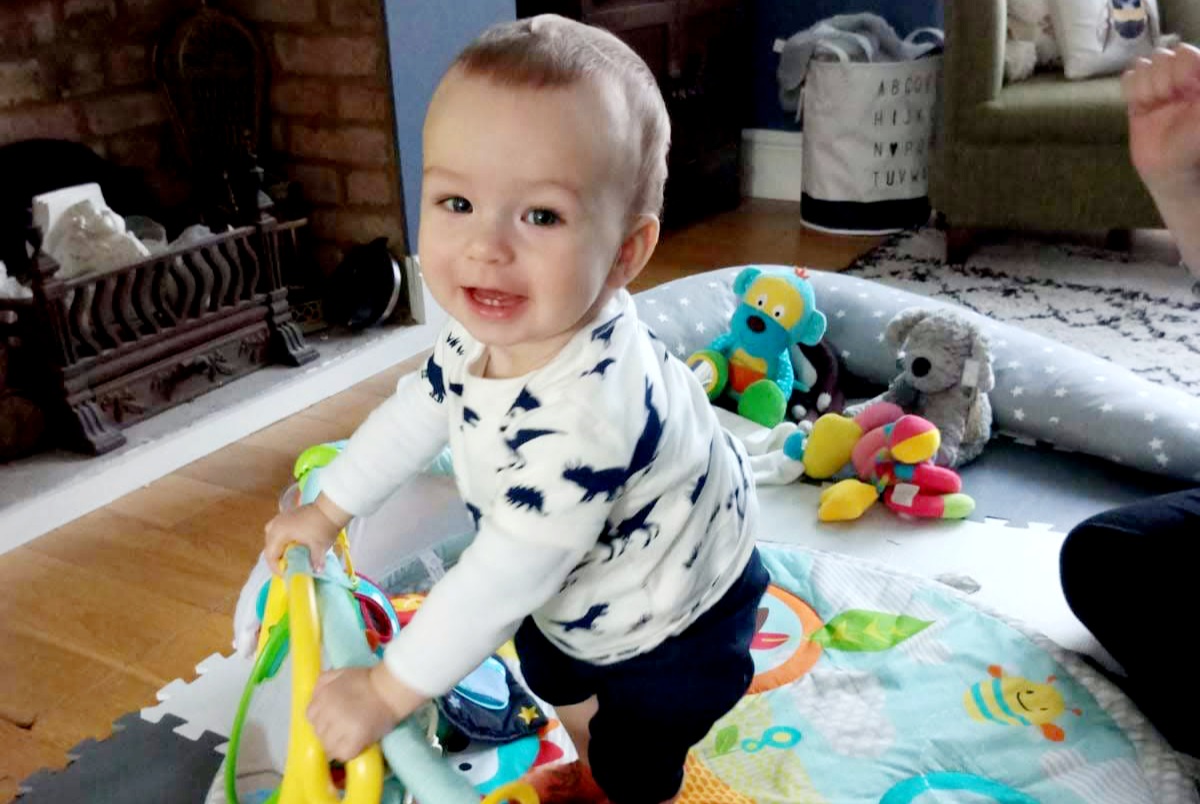8-month sleep regression causes, signs - and how I survived it with my son
The 8 month sleep regression can include shorter naps, or no naps, extreme fussiness at nap or bedtime, fighting sleep, and frequent waking at night.

The 8-month sleep regression is progression, which can result in shorter naps, or no naps, extreme fussiness at bedtime, and frequent waking at night.
Until now, you might have used some of the best baby monitors, baby sleep aids, and various other kit to help your child get a better night's sleep. But we know that - similar to the other sleep regression ages - in the first three years of your baby's life the 8-month sleep regression is where your previously OK/good/fantastic sleeper now won't settle for naps or bed. And, if they DO settle they wake, throughout the night, for no apparent reason. Sarah Patel, a sleep consultant knows this is a tricky time and tells us; "My advice is to stop, take a breath and try to let go. Step back and watch, look for what kind of support your baby needs at this time. Follow our instinct."
Sleep is a commodity, one coveted the most by tired parents, especially if they are in the grips of an 8-month sleep regression, left wondering when babies sleep through the night.
Here our Family Editor and mom-of-one Stephanie Lowe shares how she survived the 8-month sleep regression, and part of it was reading the best baby sleep books.
8-month sleep regression: Causes and signs
The 8-month sleep regression is primarily a progression, causing shorter naps, or no naps according to various resources. Signs it's happening would be your baby being extra fussy at nap or bedtime, and fighting sleep, and frequent waking at night.
Many parents report sleep issues with their babies. Around 8 months old, babies are busy. They learn to sit up or crawl, and are babbling away making new sounds every day. With all that activity, reports show that it’s not surprising that their afternoon nap is losing its appeal or that they’d rather stay up with you at night. Below we share the three primary causes:
- Physical milestones - such as sitting up
- Mental development - Notice that certain objects, sensations, animals, and people belong together in categories
- The 3 to 2 nap transition - dropping that third nap
And here are four primary signs your little one is going through a the 8-month sleep regression:
Parenting advice, hot topics, best buys and family finance tips delivered straight to your inbox.
- More nighttime waking
- Difficulty getting to sleep initially or after a nighttime waking
- Heightened fussiness, crying, or agitation around bedtime
- Longer daytime naps and less nighttime sleep
The main sign for me, with Ted, was that he was waking way more at nighttime and taking longer to settle, so he would need me in the room more.
How long does the 8-month sleep regression last?
Usually between two to six weeks. For Ted, it was more like four weeks, and I felt like a zombie. A frustrated zombie who was dreading the nights, and fast losing the will to live. It’s a total myth that sleep is linear. In reality, it's often all over the place for the first 3-ish years, with better and worse periods because of different reasons.
Before the sleep regression hit, we were in a rhythm, I knew what was coming each time.
Sarah Patel, sleep consultant, tells us; 'Your baby's sleep is always changing, and that can be hard to deal with. I've found that when baby's change in any way parents tend to panic and immediately try to "fix it".
This was definitely me, as a new mom I felt I needed to stop him crying and have all the answers already. I felt like I was constantly failing, when in reality I was new to a job, with a little boss who also have no clue what he was doing. We both needed time. Time to get used to each other and all these new feelings and lessons.
"How I survived the 8-month sleep regression"
Our Family Editor Stephanie Lowe shares tips on how she, and her little one Ted, survived the 8-month sleep regression.
Name: Ted Age: 8 months Sleep set up: In his own room, crib, semi-dark, (blackout blind in place but some light comes in around the sides) Naps: 1.5-hour morning nap, 1.5-hour early afternoon nap Bedtime: 6pm(ish)

"The 8-month sleep regression almost beat me. I was in tears. Exhausted. Overwhelmed. And at a total loss. Frequently Googling 'Will I ever sleep again?'. Ted is my first child and no one really told me much about sleep regressions or awake windows, or just how much tracking your baby’s cues can help in this confusing world of parenting. As a newborn Ted slept 16/17 hours a day, it was bliss.
Recent resources show that during the first month, babies will spend around 16 hours a day sleeping. This will usually happen in the form of three - or four - hour naps between feedings. After a newborn has been awake for one to two hours, they'll need to sleep again.
Up until about 7.5 months old Ted was sleeping really well. And, even though he was teething he was napping in the day and going down at night with minimal fuss, waking in the night for one feed and going straight back down. Or, if he woke in pain, he'd take Calpol a five-minute cuddle and go back down.
However, Ted suddenly started waking more throughout the night, some nights it reached four times. I was at a loss and not sure what to do. Or why his sleep had fallen off a cliff - some nights he was wide awake showing no signs of sleep - not what you want at 2 am.
1. I tracked my baby's sleep
Tracking Ted really helped. His ‘awake windows’ at 8 months should be a maximum of 3.5 hours, but I had him awake for a lot longer in the afternoon, so much so that I was missing his ‘sleep window’ and he was becoming overtired. This made settling him a long and drawn out nightmare. I didn't use a fancy app to track, I just text my husband with ‘awake’ so I could keep a diary of times, see if there was a pattern. Getting him to sleep within his ‘sleep window’ made settling much better and easier. Though he was still waking every 45 mins, as this was his sleep cycle.
2. I looked out for his sleep signs
On the advice of Tracy Hogg, author of The Sleep Whisperer I pause Friends Episode 9 and really pay attention to Ted. I work out that he’s been awake for over 2 hours, so I start looking for his sleep signs. Recent studies show that sleep patterns are often learned in babies, and that embedding good sleep habits can be useful for your baby, to do this you need to watch out for your baby's sleep signs.
Ted's top tell-tale signs are;
- Rubs his eyes
- Looks away when I try to engage him
- Stares into space
- Goes still - his arms his legs everything is still
That last one is a great tell, as normally every limb is jiggling, but when he’s just lying there, and I know he’s been awake for a while, it’s a clear sign he's ready for sleep.
3. I put a clock in his room
Sounds simple, right? Yet so effective. I put up a clock in Ted's room that ticked aloud, this helped me realize that when Ted woke, lets say at 2 am, I never gave him enough time. I would fly in and expect him to go back to sleep within a minute, not really fair given how new he is to all this.
Hearing the seconds tick away made me slow down. Five minutes at 2 am feels like a lifetime, but it's really not, it's just five minutes. Sitting with Ted for longer than the 22.4 seconds I was giving him previously really helped to settle him and counting the ticking seconds calmed me.
4. I reminded myself it was part of his development
I also realize, from the Sleep Whisperer book, that all the tummy time, rolling over, and sitting up he’s been doing all play a huge part in how tired he is. There's a lot going on in his little brain. All of this is directly linked to his struggle to sleep. While we can't change that, as it's development, understanding what causes this waking helped me stay calm.There is nothing I can do but be here for my baby as he goes through it.
5. I researched sleep cycles
Adults, children and babies 3 months+ wake every 45 minutes we just don’t tend to notice it, or we do briefly but doze back off - this is what we need to help our brand new baby to do.
The Sleep Whisperer book advises that if you use a certain way to settle your baby and you're not happy doing that at 3am (i.e. driving in the car/walking the stroller) then rethink it. When your baby wakes at their 45 minute sleep cycle they will need the same setting to drop off. So if you were there shhh'ing them to sleep that's what they will need again in 45 minutes. If you're happy doing that then great.
We would put Ted in his crib dozy but awake, set up his Ewan Sleep Sheep, for the longest period and say 'it's time for sleep'. When he woke again at 45 minutes we'd do the same.
Sarah shares her top parenting advice with us; 'When sleep progressions hit it's all about survival - you do enough to get through it. You know your baby better than anyone. You're a team and they need you to support them.
'If that's laying with them then so be it. The old adage "your making a rod for your own back" needs to retire now, it's judgmental and unhelpful. As parents we need to be there for our baby when they are struggling. There is no rod, it's all about love and support.’
What I learned about the 8-month sleep regression
There is no quick fix. You just have to get through it, as best you can without introducing any new sleep routines you don't want to keep after the sleep regression. The NHS recommends routines, these worked wonders for us. There are so many things out there to help us parents get as much sleep as possible! From the best Moses baskets, to the best sleep aids to help babies sleep through the night. Don't overlook them. A well-placed Ewan Sheep could work wonders.
Also, knowledge is power. Firstly, building up the knowledge of your baby's cues, secondly tracking his awake time, and thirdly noting what skills he was mastering and understanding what he's going through helped.
Most of the stress I felt was because I had no idea what to do, or what was happening. When I started understanding why my baby was going through this, it helped immensely.

The 8-month sleep regression: Sleep schedule
Morning sleep schedule
Before:
6-6.30 am - wakes up, we have cuddles 7 am - nappy change, bottle 8 am - breakfast (baby-led weaning, cut up bananas, toast fingers) dressed and play 9.30 am - nap in the crib, pull blinds down, has a bottle, “read a book” and Ted is put down. Usually has 1.5 hours. 11 am - wakes or I gently wake him, nappy change. 11 am-noon - play then lunch with plenty of protein to make sure he has a full tummy (doesn’t usually “eat” much though)
After:
6-6.30 am - Wakes up crying 7 am - Nappy change, bottle 8 am - Breakfast (baby-led weaning, cut up bananas, toast fingers) dressed and play 9.30ish - Take Ted up to his crib, where he cries whenever I leave the room. 11.45 pm - I SCREAM INTO A PILLOW as I have spent the last 1.5 hours trying to settle my child only for him to have a 12-minute nap - that’s literally a long blink. 11.45 pm- 12 pm - Play/mommy makes another coffee/and turns the Netflix off she was going to binge during the usual 1.5-hour nap.
Afternoon sleep schedule
Before:
12.45 pm - bottle and nap for 1.5 hours 2.15 pm - if not already awake then gently wake him up, nappy change
After:
Noonish - lunch with plenty of protein to make sure he has a full tummy (doesn’t usually “eat” much though) 12.45 - bottle and a fun game of will-he-won’t-he-sleep for the next hour as he just isn’t settling. 2.15 pm - Furiously sighing on loop as yet another nap didn’t happen. Ted’s irritable, and I'm hating today as I have no clue what to do or how to ‘fix’ this. HE USED TO SLEEP!
Evening sleep schedule
Before:
4.45 pm - dinner, again plenty of protein, carbs and veg plus fruit and yoghurt for pudding and a ½ bottle. 5.45 pm - bath 6.15 pm - into his room for a bottle and book. Play the same calm music while dressing in a sleeping bag 6.30 pm - put him down to sleep and he sleeps
After:
5 pm - dinner and a ½ bottle. Google ‘why is my baby broken’. 5.45 pm - bath 6.15 pm - HOLD MY BREATH IN HOPE as we start his bedtime routine, praying this is unaffected. Settle Ted with a 1/2 bottle and book. Play the same calm music while dressing in sleeping bag 6.30 pm - put him down to sleep, starts crying before he touches the mattress. 6.30 pm - 745pm - attempt to settle an irritable and overtired Ted. 7.45 pm - Drifts off, I sneak out 7.49 pm - Wakes crying
Nighttime sleep schedule
Before:
10.30 pm - wakes for bottle goes back down 4 am - cries for a bottle, goes back down
After:
8.30 pm - Ted sleeps 8.45 pm - I fall asleep in my bowl of spaghetti hoops 10.30 pm - Wakes for bottle remains wide awake for an hour 11.30 pm - Falls asleep on me, but settles ok in crib, I sneak out 12.15 am - Wakes, I try to settle him
2 am - Ted sleeps with me in the room ‘shhh-ing 4 am - Wakes, bottle and refuses to settle for 30 minutes (I’m so tired I could cry) 7 am - IT ALL STARTS AGAIN.
"Just three days into the 8 month sleep regression and I am literally at my wit's end, I have no idea what to do so I start Googling and come across The Baby Whisperer book.
I learn about sleep regressions, awake windows, and also how much sleep needs to change as your baby grows. I also read all about tracking and Paying attention to his sleep cues. This is all brand new information for me! Information I am hoping will help!"
Related features:
- Baby sleep training - what is it, when to start and the best teaching methods
- Ferber Method of sleep training, what is it?
- 4 month sleep regression - signs, solutions and how long it lasts
- 10-month sleep regression causes, signs - and how I survived it
- How to get a baby to sleep - Your ultimate guide
Video of the Week
Stephanie has been a journalist since 2008, she is a true dynamo in the world of women's lifestyle and family content. From child development and psychology to delicious recipes, interior inspiration, and fun-packed kids' activities, she covers it all with flair. Whether it's the emotional journey of matrescence, the mental juggling act of being the default parent, or breaking the cycle of parenting patterns, Stephanie knows it inside out backed by her studies in child psychology. Stephanie lives in Kent with her husband and son, Ted. Just keeping on top of school emails/fundraisers/non-uniform days/packed lunches is her second full-time job.